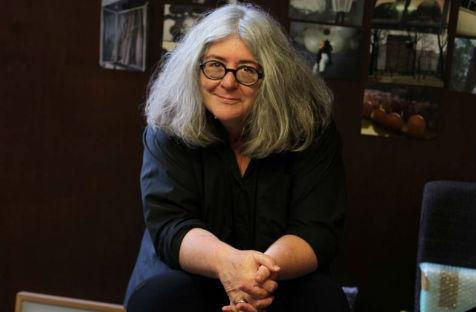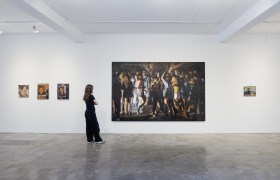A curator, writer, publisher, and designer, Juliana Engberg is currently the Artistic Director of ACCA (Australian Centre for Contemporary Art, Melbourne, Australia), where she has curated numerous exhibitions including: We Are All Flesh (Berlinde de Bruyckere), I Packed the Postcard in My Suitcase (Pipilotti Rist), TRILOGY (Yael Bartana), Appearances (Nathan Coley), ‘(Waiting for –) Texts for Nothing’ Samuel Beckett in Play (Joseph Kosuth), The Dwelling, Gestures and Procedures, Cinema Paradise, The Water Hole (Gerda Steiner and Jörg Lenzlinger), and Eight Miles High (Jim Lambie).
She is also Artistic Director of the 19th Biennale of Sydney, the most prestigious international contemporary art event presented in Australia.
Engberg was Curator of the Melbourne Festival Visual Arts Program for seven years (2000–06), during which time she curated new projects by Tacita Dean, Martin Creed, Daniele Puppi, Callum Morton, Fiona Tan, and Van Sowerine. In 2007, Engberg was the senior curatorial advisor for the Australian presentations at the Venice Biennale and recently inaugurated the ACCA POP-UP PROGRAM in Venice to coincide with the 54th Venice Biennale (2011). Engberg received the coveted Herald ‘ANGEL’ award for the visual arts programs she developed for The Edinburgh International Arts Festival 2009.
Engberg was the inaugural curatorial resident at Spike Island Artspace, UK (2000–01), a Visiting Critic at the Glasgow School of Art, Scotland and a visiting juror for the Rijksacademie, Amsterdam. Prior to this, she was Artistic Director of the internationally acclaimed Melbourne International Biennial 1999 Signs of Life and Senior Curator of the Art & Industry Biennale, Christchurch, New Zealand in 2002. Engberg has worked as Senior Curator at the Heide Museum of Modern Art, Melbourne and was Assistant Director of the Monash University Gallery, and Director of the formative contemporary art space, the Ewing and George Paton Galleries, The University of Melbourne.
What did you want to be when you grew up?
Older.
When did you know you would work in the arts?
When I was 14.
How would you describe your work to a complete stranger?
I work with art and artists to create art exhibitions and related events on behalf of and for the engagement of audiences.
Is there a mission to your work?
To help people think through ideas and tactile encounters to increase and improve their creative opportunities, pleasures and cognitive capacities.
What’s the first thing career related you usually do each day?
Walk or swim and think, then write, then answer emails.
Can you describe an “average” working day for you?
Not really, I don’t have average days I’m sorry, my work life is varied and takes place all over the world, and changes all the time…but I always do ‘office (hotel, airport lounge, cafe)’ work like emails etc. at the beginning, middle and end of the days. The rest of the time I roll with the flow of meetings with artists, colleagues and whomever else… write, think…and try to avoid late night events.
What’s the one thing – piece of equipment, toy, security blanket, – you can’t work without?
My brain.
What gets you fired up?
Injustice.
Who in the industry most inspires you?
Artists inspire me.
What in the industry do you despair about?
The gradual but unacknowledged privatisation of the public arts sector created by the necessity to raise funds to maintain sustainability and to prop up the lack of investment from government sources which is at a deplorable level.
What is the best thing about your job?
It requires ingenuity and that keeps me going.
What’s the worst?
Trying to make budget every year.
What are the top three skills you need in this industry?
Creativity, Intelligence, Humour.
What advice would you give anyone looking to break into the field?
Volunteer.
How do you know when you missed the mark?
You always miss the mark, you can always do better.
When do you know you’ve made it?
I would never assume that.
For more information about GREAT Britain Arts 2013 visit greatarts13.org.au or check out our dedicated Festival Focus.





